Tom Rush was part of the legendary Cambridge folk music scene, with his early albums containing a mix of folk, blues, and country music. A few years later, his milestone 1968 album The Circle Game introduced songs from up-and-comers Joni Mitchell, Jackson Browne, and James Taylor to a wider audience, and also included Rush’s “No Regrets”, which has been covered by artists ranging from the Walker Brothers to Emmylou Harris to Midge Ure. His latest album was 2024’s wonderful Gardens Old, Flowers New.
This interview was for a preview article for Noozhawk for the 11/16/25 concert by Tom Rush and Judy Collins. It was done by phone on 10/31/25.
Jeff Moehlis: What can people look forward to at the upcoming concert here in Santa Barbara?
Tom Rush: Well, Judy Collins, of course, is fabulous. I don’t know for sure, but I think we probably will be doing a song or two together at the end of the night, but I’m not sure of that yet. For my set, I’ll be doing some of the old favorites, of course, because that’s why people come to shows, to hear the old favorites, the songs they know and love. I’ll also be doing some songs from the latest album. I think my latest album actually is my best yet. I wrote all the songs, and I think there’s some good ones in there. So, I’ll be trying out some of them. Plus, you know, maybe a brand new one or two. I’ve got one that I’m going to try out. It’s kind of a love song called “Takes a Whole Lot of Liquor to Like Her”.
JM: [laughs] Nice.
TR: Seems to be a crowd-pleaser.
JM: I listened to your new album Gardens Old, Flowers New, and it is quite nice. How did that album come together?
TR: It was actually my accompanist Matt Nakoa, who got tired of me talking about maybe someday we’ll record some stuff and just booked a studio in Connecticut and hired some fabulous players. Next thing I know I’m having the time of my life for five days hanging around this wonderful studio and recording these songs. It turns out Matt is a mind-blowingly brilliant musician. It turns out he’s also a fabulous record producer. He did a great job.
The title line of the album is from a song [“Siena’s Song”] I wrote for my baby girl who’s now 26, but I wrote it when she was a year or so old. It comes from “Siena’s playing in the gardens / She loves to watch the sky for airplanes”, blah blah blah. “This garden’s old, the flowers new / A flash of sunlight in the dew.”
The point being that watching your child grow up is something that’s happened for thousands of years. But every time it’s new. The garden is old, but the flowers are new. Matt, my producer, decided to use the context that I am the old garden, and the songs are the flowers. Okay. All right.
JM: As I say, I listen to it and it sounds great. So, congratulations on yet another wonderful album.
TR: Oh, thank you. Thank you.
JM: The upcoming concert is Judy Collins and Tom Rush. I’m curious, do you remember when you first met Judy Collins and what your first impressions were?
TR: We go way back, but I don’t remember when I first met her. She was part of the New York folk scene and I was up in the Boston / Cambridge scene. There was a lot of interplay between the two scenes, but I don’t remember when I first met her.
I remember that when I wrote my song called “No Regrets”, which is the one that’s been recorded by the most other artists, I think the first person I played it for was Judy in her apartment in New York. But I can’t put a finger on when we first met.
JM: Do you have a favorite song that Judy sings, one that every night you’re just looking forward to?
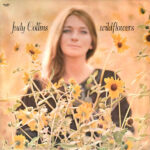
TR: There is of course “Both Sides, Now”, written by Joni Mitchell. I remember Joni telling me that she was thinking of me when she wrote it, but he gave it to Judy [laughs]. Oh, okay. All right. This doesn’t hurt my feelings at all.
JM: Well, of course, Judy does a beautiful version of it.
TR: Oh, she does. She does. Stunning.
JM: You mentioned that you were part of the Cambridge folk music scene. If you think back to that time, do you have any favorite memories or maybe other artists that you just loved seeing from back then?
TR: There was a coffee house called the Club 47. It was about a block from my dorm room, and it was absolutely fabulous because they hosted not only the youngsters, myself included, but they brought in the legends, and you could sit in this little 80-seat room and listen to Flatt and Scruggs, Bill Monroe, the Carter family, and a lot of the old blues legends. And very, very often there would be a party after the show at Bob and Betsy Siggins’ house. Betsy Siggins was managing the Club 47 for a while, and the legends very often would come to these gatherings. And you could ask Sleepy John Estes, “how do you do that thing you do?”, and he would show you. It was absolutely stunning.
I do remember thinking when I got to town, fall of 1959, there were a lot of youngsters playing bluegrass, and Delta blues, and Chicago blues, and Irish-Scottish ballads, and I remember thinking it’s a bit ironic to have a bunch of Harvard students sitting around singing about how rough it is in the coal mines. But we thought we could make up with sincerity what we lacked inauthenticity.
JM: The Greenwich Village / New York City folk folk scene is romanticized, and there’s all kinds of books about it. The Cambridge folk music scene doesn’t seem to have as much documentation, or maybe I’m just not looking in the right places. Any thoughts on how the Cambridge scene differed from the the Greenwich Village scene?
TR: There is a book [“Baby, Let Me Follow You Down”] written by Eric Von Schmidt and Jim Rooney about that about the Cambridge scene, and there’s been a couple of documentary films about it as well. But let me just let me just ponder for a second here.
I think in Cambridge there were a lot of people who were fabulous musicians who had no intention of being professionals. There was a brilliant high-harmony singer / mandolin player, Joe Val, who was a typewriter repairman and was quite content being a typewriter repairman. There was a banjo-playing psychopharmarmacologist who was very popular for a variety of reasons. He was very, very good at playing and singing, but, you know, he had a job, and that was what he wanted to do.
In New York, I think everybody was more inclined to get matching outfits and go on the road. They were much more interested in developing careers.
JM: Was there a friendly rivalry between the scenes?
TR: I don’t know if anybody thought of there being a rivalry between the scenes. There was a good deal of, you know, crosstalk. I’d go down to Greenwich Village and play in the clubs, and Dylan played at the Club 47 on one occasion. It wasn’t billed. He was a guest, you know, got up and did a few songs. We visited each other’s turf, but I don’t know if I would consider a rivalry.
TR: I do remember Dylan coming up on one occasion when he started making a name for himself. There was a party at somebody’s house. I can’t remember whose house it was. And every time Dylan would walk into a room, everybody else would leave. Nobody in Cambridge wanted to be seen as sucking up to Dylan. So they went a little too far in the other direction.
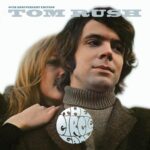
JM: I do want to ask you about one of your older albums, probably your best known album – The Circle Game. When you look back, what are your reflections on that particular album?
JM: Well, that album got me accused by Rolling Stone of ushering in the singer-songwriter era, because it introduced Joni Mitchell, James Taylor, and Jackson Browne to the world. The fact that these three brilliant writers were all being introduced on one project got people’s attention. I wasn’t trying to introduce anything or usher in anything. I just needed some good songs. I started out recording traditional folk, and that included a lot of different genres. It was, you know, Irish-Scottish ballads, but also blues, also bluegrass. I was all over the lot.
[laughs] I remember my first album being showcased at the Harvard Coop record store, and I went in there and it was it was under the Folk section. And I got the manager and I said, “Well, I guess I do some traditional folk, but I also do blues.” And he said, “OK”, and he took them and put them in the Blues session. And I said, “But wait, I also do some country.” It ended up in Miscellaneous.” I learned I learned my lesson there, right? [laughs]
But for the Circle Game album, I’d stopped doing traditional folk and blues and stuff. My previous album for Elektra was kind of schizophrenic. On one side, I did the remaining traditional folk and blues tunes that I could think of, that I actually was excited about. And the other side, I went back to my to the rock ‘n’ roll days, and did a bunch of rock ‘n’ roll covers from the 50’s.
And then I just did not know what I was going to do next, and two years went by and Elektra was getting rather impatient with me, understandably. And along come Joni, Jackson, and James out of the blue with these stunningly gorgeous songs. So there was no question about it. I covered those tunes. And my own song “No Regrets” was on that album. But I wasn’t looking to discover or usher in or any of that stuff. I just needed some good songs.
JM: How did you find out about those songs? Did you hear them perform the songs, or were they shopping around their demos?
TR: Each one’s different. Joni came into a club I was playing at in Detroit, Michigan, and got up and did a four-song set. The owner gave her permission, if she wanted to play some songs so that I might record them, because she had just started writing songs. And that worked out well.
She did “Urge for Going” that night. I asked her if she had any more new songs, because I was overdue for delivering this album to Elektra, and she basically said, “No, but give me a minute.” She sent me a tape a few months later with six gorgeous songs. And just before the last song in the tape, she apologized for the upcoming tune. “I just finished writing this. It’s not much good. I’m so embarrassed, but here it is.” And it was “The Circle Game”. I named the album after it.
Jackson Browne’s songs were being published by Elektra. At that stage, he was not really interested in being a touring musician. He was a songwriter. But Elektra had his publishing, so I got to hear his demos and that’s how I “met” Jackson.
James Taylor, it’s funny. I almost intersected with James over and over up in Cambridge, Massachusetts. I had a roommate who was a big fan of his band, The Flying Machine, and Zack kept saying, “You’ve got to hear this band.” And I kept saying, “Zack, just clean up your room, would you?”
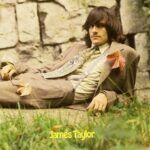
A year goes by, and I’m in New York, and my producer Paul Rothchild says this guy named Taylor is going to come over this afternoon and play some songs for you. They gave us this empty room, no furniture. We sat on the floor with a tape recorder, and James sang about four or five songs into the tape recorder and, then went off to England. And we know we know what happened then. But I recorded his songs for for The Circle Game album, and apparently that helped get him a record deal. Because the producer for his first album, Peter Asher, made the comment, “If you’re good enough for Tom Rush, you’re good enough for me.” [both laugh]
JM: Hey, that’s that’s a good endorsement. You mentioned Elektra Records, and that was kind of, in my mind, the golden age of Elektra Records. What was it like being on that label at that time?
TR: It was very cool. I moved from Elektra over to Colombia, which is now Sony. But Jac Holzman was the boss man at Elektra, and he was very available. If you had an issue or anything, or just wanted to have lunch, Jac was available. He was very instrumental in boosting a lot of the the folk artists, and he produced and had very good-looking album covers. I remember people telling me, “I bought your album because it was on Elektra.” They’d never heard of me, but the fact that it was on Elektra, it must be good.
He then kind of drifted off. The Doors started occupying a lot of his attention, and the rock scene. My contract was up, and it was renewable, and Jac said he would renew it but he wouldn’t improve on it. You know, he wouldn’t give me any anything more than the original contract. And my manager at the time shopped around, and Colombia was going to give me a significant boost. It was a very, very different label. Everybody at Columbia had to wear suits and ties. They couldn’t have plants in their office. And you couldn’t talk to the boss. You had to talk to somebody’s secretary, invariably. And they referred to my brilliant, brilliant recordings as “product” [both laugh], which I found offensive.
JM: Yeah, the music business. Keyword “business”, right?
TR: With a capital B. But they did get me a much wider audience than Jac had. So I’ll forgive them. I’ll forgive them someday.
JM: Well, in the end, it all worked out, right?
TR: It did.
JM: You mentioned your song “No Regrets”, which has to be your your best known song. A little cheeky question, when you look back, do you have any regrets?
TR: Oh, yeah. I definitely have regrets. The guy in the song, it’s funny. When I wrote the song I was living in Cambridge, and this girl named Jill Lumpkin flew up from New York and spent the weekend with me. I’d never spent that much time with anybody before. I took her back to the Logan Airport on Monday to fly back to New York, and it felt strange walking away alone, because I hadn’t been alone for three days and three nights. I went back to my apartment and wrote the song, just making it up as though it had been a long substantial relationship.

Which then in fact came to pass. It all it all came true. We had a long substantial relationship, and broke up. But the song was pretty much imaginary to begin with. It’s been recorded now by Emmylou Harris and Waylon Jennings, and I just learned that Harry Belafonte did it. There’s a band in England called the Walker Brothers who had a huge hit with it, put my first two kids through college so that’s my favorite version.
On top of that, there were a bunch of other hits. There was a heavy metal version, a hip-hop version that I did not recognize when somebody played it for me but it was a hit, and U2 covered it. So there was an extra zero on the royalty statement that year.
JM: Well, Midge Ure, the New Wave musician also in England also had a hit with it. I was going to ask you what your favorite version is, but you already answered that.
TR: The Walker Brothers got it out there. Their version was almost a note-for-note copy of my version, and they never reached out to me and asked if I had any more songs. It was by far their biggest hit. When they put out a retrospective 20 years later, they called it No Regrets. And they never reached out to me to see if I had any more songs that they might be interested in. I, on the other hand, never reached out to them either. So there you go.
I saw I saw an interview in a magazine where the interviewer’s asking Bono about “No Regrets”. “So you recorded ‘No Regrets’, and Bono’s response was, “Yeah, that Scott Walker, he’s a genius.” [both laugh] I said, “Hello. Excuse me. Over here.”
Actually I met Bono before a show in Phoenix, and we got a little bit of hang time and he apologized for that. And then they did “No Regrets” at the show, and he credited me after the after the song was over. But what he said was “Tm-rsh”, and nobody could understand what he what he just said.
JM: What advice would you give to an aspiring musician?
TR: I would say play in front of a live audience as much as possible. Rehearsing in your bedroom or in the garage with your band is great, but play in front of of a live audience and pay attention to what’s coming back from them. What you’ll figure out somewhere around the 14th verse is that maybe the song’s too long when they start looking at their watches and shuffling their feet,.
But it’s really hard to get started these days. You know, back when I was getting started, if you didn’t have a record deal you didn’t exist. You were invisible. But if you had a record deal, they would get you on the radio and written up in the press and on the TV and support your tours and everything. That doesn’t happen anymore. It’s very, very difficult.
I should mention Rockport Sundays, an online video series that I’ve been doing since Covid hit. We post an episode every Sunday. They’re about 15 minutes long, and they stay up for 8 weeks. It’s me and a guest having a chat, and each doing a song. A lot of my guests, especially lately, have been these youngsters who are absolutely brilliant. They should be playing stadiums, but they’re playing bars. And I’m trying to figure out what I can do to help. I guess I got my foot in the water helping get Joni, Jackson, and James on the radio. So, what can I do for the new generation of really, really talented youngsters? I’m working on it.
JM: That’s great. Are there any you want to mention specifically, for us to keep an eye out for?
TR: There’s a guy named Brendan Cleary, who I think is terrific. I’m thinking I might actually take him on the road with me. I got him his first headline gig in Portsmouth, New Hampshire. He was so excited. He never headlined a show before. He always played in bars where people are asking you to not be so loud, because they’re trying to have a conversation and, you know, playing covers, playing everybody’s hits, maybe throw in a song of your own once in a while. And he got to do a whole evening of his own songs and knocked it out of the park. He got multiple standing ovations. Brendon Cleary is really good.
And I just ran into a young woman named Renee Levesque, who I think is as good as anybody I’ve ever heard. And she also has been playing bars.
Sign up for Rockport Sundays folks! It’s cheap, and it’s really fun. And go to tomrush.com, click on shows, and there’ll be a drop down menu that’ll take you right to the ticket page for the Lobero. And also you can check out Rockport Sundays, to see if you’re interested.
JM: Here’s a crazy idea. How about getting these great young songwriters and do an album with their songs, maybe duets, kind of like what you did with Joni, Jackson, and James?
TR: It’s a brilliant idea and I’ve already had it. [both laugh] I’m thinking there’s enough really good songs there that I could actually do. I mean, I hear songs that are that I think are brilliant, but I have no interest in doing them myself. But then there’s others that I think, yeah I could do that.
My technique is when I learn a song from somebody else, I learn it and then I don’t listen to the original again. The idea is the song will drift off from its moorings and become my version over time. It won’t be the same as the songwriter’s version. Which I think is okay.
JM: It’s good for the audience, too, because then we have more than one version that we can listen to.
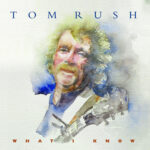
TR: A good example – it’s not on the latest album, I think it’s on the previous one – I recorded “Drift Away”, the Dobie Gray hit, with just just a solo guitar and a cello. It’s a very different song. There’s a really sad song in there. It starts out with “Day after day I’m more confused”. There’s a really sad song underneath all those screaming guitars and saxophones and drum solos and stuff on the Dobie Gray version.
JM: I’ll check that out. That sounds interesting. My last question for you, and this is just because today is Halloween, do you have any Halloween memories that you’re willing to share, maybe from your childhood or gigs you did on Halloween or anything?
TR: I remember I was living in New Hampshire, and my kids were Halloween age, and they got all they got all gussied up and went out with their friends to Trick or Treat. I got my hair dyed green in spikes, and my mustache was purple, and I put on a tuxedo. Oh, and my fingernails were purple. And I was hanging out with the kids in downtown, wherever it was, and I thought, you know, I need a beer. I went into the bar to get a beer, and this woman comes running up and says, “Aren’t you Tom Rush?” [both laugh] What do I have to do?

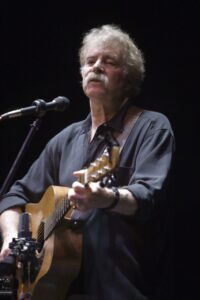

Discussion
No comments for “Interview: Tom Rush”